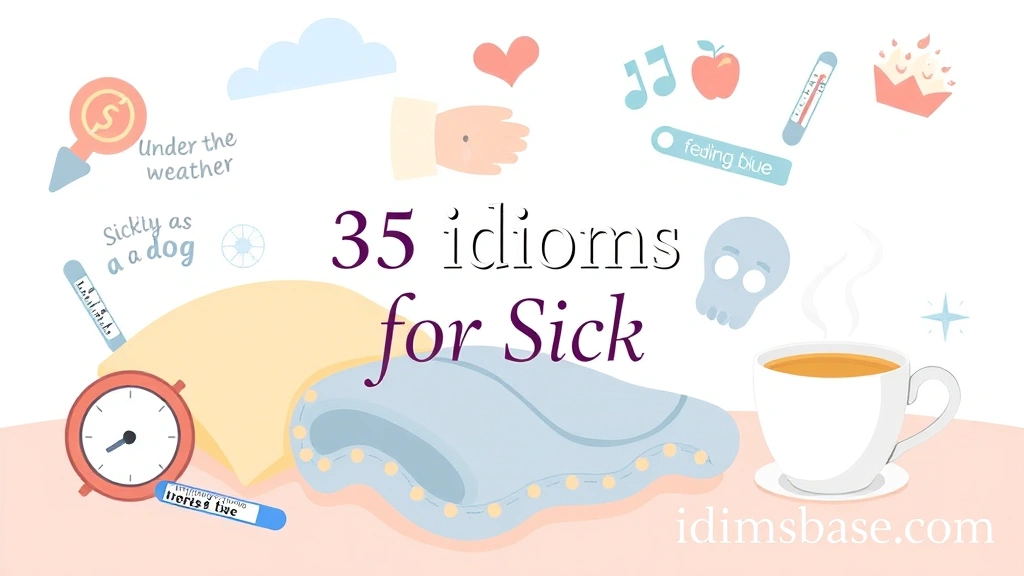Oh, hello there! Ever found yourself feeling a bit under the weather and struggling to express it in a way that truly captures your mood? Or maybe you've heard someone say they're "feeling a bit green around the gills" and wondered what on earth they meant? Well, you're in the right place! English idioms are incredibly colorful, and when it comes to talking about being sick, they truly shine. They add so much flavor and nuance to our conversations, making communication richer and more engaging.
Imagine trying to explain a persistent headache without saying "my head is throbbing." A simple "I have a headache" just doesn't quite cut it, does it? Idioms allow us to paint a more vivid picture, often with just a few words. They're like secret codes that native speakers understand, and once you crack them, your English will sound much more natural and sophisticated. So, whether you're learning English, or just looking to expand your vocabulary, diving into these expressions will be a real treat. Let's explore 35 fantastic idioms that describe feeling unwell, from a slight sniffle to something more serious. Get ready to impress your friends and colleagues with your newfound idiomatic prowess!
35 Idioms for Feeling Sick
Let's dive into this wonderful world of expressions! Each one tells a unique story about feeling unwell.
Common Idioms for Mild Illness
These are perfect for when you're not feeling 100%, but it's nothing too serious.
- Under the weather: This is perhaps one of the most common and polite ways to say you're not feeling well. It suggests a general sense of being unwell, perhaps a cold or just feeling run down.
- Example: "I'm feeling a bit under the weather today, so I think I'll work from home."
- Feeling a bit off: Similar to "under the weather," this implies a slight deviation from your usual healthy state.
- Example: "I've been feeling a bit off since yesterday evening, a slight headache and a bit tired."
- To have a touch of something: This means you have a mild case of an illness, often a cold or flu.
- Example: "It seems I have a touch of the flu, so I'm going to bed early."
- To be coming down with something: You're starting to show symptoms of an illness, and you anticipate getting sicker.
- Example: "I think I'm coming down with something; my throat feels scratchy."
- To be run down: This describes feeling exhausted and weak, often due to stress or overwork, making you more susceptible to illness.
- Example: "After working so many long hours, I'm completely run down."
- To be laid up (with something): You're confined to bed or home due to illness or injury.
- Example: "She's laid up with a bad back and can't come to the party."
- To be on the mend: Great news! This means you are recovering from an illness or injury.
- Example: "After a week in bed, I'm finally on the mend."
Idioms for More Specific Symptoms
Sometimes, you want to be a little more descriptive about what's going on.
- Green around the gills: This idiom describes looking pale and nauseous, as if you're about to vomit.
- Example: "After that bumpy boat ride, he looked a little green around the gills."
- To have a splitting headache: This is not just any headache; it's an extremely severe one, often throbbing.
- Example: "Please be quiet, I have a splitting headache."
- To be sick to one's stomach: You feel nauseous and might vomit.
- Example: "The smell of that spoiled food made me sick to my stomach."
- To be sick as a dog: This means you are very sick, often involving vomiting.
- Example: "After eating those suspicious oysters, he was sick as a dog all night."
- To feel poorly: A polite and somewhat old-fashioned way to say you don't feel well.
- Example: "My grandmother is feeling poorly today, so I'm going to visit her."
- To be out of sorts: You're not feeling yourself, often a bit irritable or unwell.
- Example: "He's been a bit out of sorts since he caught that cold last week."
- To have a frog in one's throat: Your voice sounds hoarse or raspy, often due to a cold or irritation.
- Example: "Excuse me, I seem to have a frog in my throat today."
- To be full of beans (ironic use): While usually meaning energetic, it can be used ironically to mean the opposite when someone is clearly unwell.
- Example: "He's certainly not full of beans today; he looks awful." (This is less common for "sick," more for "lacking energy").
- To kick the bucket (euphemism for dying): While not about being sick, it's a grim idiom related to the ultimate consequence of severe illness.
- Example: "The old cat finally kicked the bucket after a long illness."
- To be at death's door: You are extremely ill and close to dying.
- Example: "After days with a high fever, he was truly at death's door."

Idioms for Feeling Better or Recovering
Let's not forget the good news!
- To turn the corner: You've passed the worst point of an illness and are starting to improve.
- Example: "The doctor says she's finally turned the corner and should be home next week."
- To be back on one's feet: You have recovered from an illness or difficulty.
- Example: "It took a while, but he's finally back on his feet after the surgery."
- To be as right as rain: You are completely well and healthy again.
- Example: "Don't worry about me, after a good night's sleep, I'll be as right as rain."
- To be hale and hearty: You are strong and healthy, often used for older people.
- Example: "Despite his age, my grandfather is still hale and hearty."
Figurative Idioms Related to Sickness (Not Literally Sick)
Sometimes, "sick" idioms describe emotional states or negative reactions.
- To make someone sick: To disgust or annoy someone intensely.
- Example: "His constant complaining really makes me sick."
- To be sick of something/someone: You are fed up or tired of something/someone.
- Example: "I'm sick of this cold weather; I wish it would warm up!"
- To have a sick feeling in one's stomach: A feeling of dread, anxiety, or unease.
- Example: "I had a sick feeling in my stomach when I realized I'd forgotten my passport."
- To be sick and tired of something: An emphatic way to say you are utterly fed up.
- Example: "I'm sick and tired of hearing about his excuses."
- To be sick to death of something: Even stronger than "sick and tired," expressing extreme exasperation.
- Example: "I'm sick to death of this constant noise from the construction site."
- A sick joke: A joke that is in bad taste or offensive.
- Example: "Telling a joke about someone's misfortune is a sick joke."
- A sick sense of humor: Finding humor in things that others find disturbing or inappropriate.
- Example: "He has a bit of a sick sense of humor, always laughing at the darkest things."
- To be sick with worry/grief: Overwhelmed by worry or grief to the point of feeling physically unwell.
- Example: "She was sick with worry until she heard her son was safe."
- To feel a bit queasy: You feel slightly nauseous or uneasy.
- Example: "The smell of that food made me feel a bit queasy."
- To be poorly (as in, not doing well financially/socially): While often used for health, it can also describe a bad situation.
- Example: "The company is doing poorly this quarter." (Less common for health, but worth noting the dual meaning).
- To have one foot in the grave: You are very old or very ill and likely to die soon.
- Example: "After that last health scare, he really felt like he had one foot in the grave."
- To be out for the count: Unconscious or incapacitated, often from illness or injury, similar to a boxer knocked out.
- Example: "He's been out for the count with the flu all weekend."
- To feel like death warmed up: You feel extremely ill and look terrible.
- Example: "I haven't slept in two days; I feel like death warmed up."
- To be on one's last legs: You are very tired, exhausted, or nearing the end of your life or usefulness.
- Example: "After running that marathon, I was truly on my last legs."
Table of Idioms and Their Meanings
To make things even clearer, here's a handy table summarizing some of the key idioms we've discussed:

| Idiom | Meaning | Usage Example |
|---|---|---|
| Under the weather | Feeling unwell, slightly sick | I'm feeling a bit under the weather today. |
| Green around the gills | Looking pale and nauseous | After the roller coaster, he looked green around the gills. |
| Splitting headache | A very severe headache | I can't concentrate; I have a splitting headache. |
| Sick as a dog | Very sick, often with vomiting | He was sick as a dog after eating that old sandwich. |
| On the mend | Recovering from an illness | She's finally on the mend after her surgery. |
| Back on one's feet | Recovered and healthy again | It's great to see you back on your feet! |
| Sick of something | Fed up or tired of something | I'm sick of this constant rain! |
| At death's door | Extremely ill, close to dying | For a few days, he was at death's door. |
| Feel like death warmed up | Feel extremely ill and look terrible | I've had no sleep and a fever; I feel like death warmed up. |
| On one's last legs | Very tired, exhausted, or nearing the end | After that long hike, I was on my last legs. |
Frequently Asked Questions About Idioms for Sickness
You've got questions, and I've got answers! Let's clear up some common curiosities about these fascinating expressions.
Q1: Why do we use idioms instead of just saying "I'm sick"?
A1: Great question! Idioms add color, nuance, and expressiveness to our language. Saying "I'm sick" is direct, but "I'm feeling a bit under the weather" is softer, more polite, and implies a general malaise rather than a specific illness. Idioms often convey a feeling or situation more vividly and concisely than a literal description. They also make you sound like a more natural and fluent speaker! Plus, they're fun!
Q2: Are these idioms used in formal or informal situations?
A2: Most idioms related to sickness, like "under the weather," "sick as a dog," or "on the mend," are generally used in informal or semi-formal conversations. You'd use them with friends, family, or colleagues. In very formal settings, like a medical report or a professional presentation, you would typically stick to more direct and literal language. However, "under the weather" is quite versatile and can even appear in slightly more formal contexts.
Q3: Can I use "sick" to mean "cool" or "awesome" in English?

A3: Ah, yes! This is a fantastic point. In modern, very informal slang, especially among younger generations, "sick" can indeed mean "cool," "awesome," or "amazing." For example, "That new car is sick!" or "His skateboarding tricks are sick." However, it's crucial to understand the context. If someone says, "I'm feeling sick," they definitely mean unwell, not "I'm feeling awesome." This slang usage is almost exclusively for describing things, not personal feelings of health. Always be mindful of who you're talking to and the situation!
Q4: Are there regional differences in these idioms?
A4: While many of these idioms are widely understood across different English-speaking regions (like the US, UK, Canada, Australia), some might be more prevalent in certain areas. For example, "feeling poorly" is more common in British English. However, the idioms listed here are generally recognized and used globally, making them excellent additions to your vocabulary regardless of where you are.
Q5: How can I remember all these idioms?
A5: That's the million-dollar question! Here are my top tips:
- Practice, practice, practice: Try to use one or two new idioms in your conversations or writing each week.
- Context is key: Pay attention to how native speakers use them.
- Visualise: Many idioms create a strong image (like "green around the gills"). Visualizing the image can help you remember the meaning.
- Connect them: Group similar idioms together (e.g., all the ones for feeling very sick).
- Flashcards or apps: Use digital tools or old-fashioned flashcards to test yourself.
- Don't be afraid to make mistakes: It's part of the learning process!
Key Takeaways
Wow, we've covered a lot of ground, haven't we? Learning these 35 idioms for sickness is like unlocking a new level in your English language journey!
Here's what we've learned:
- Idioms add richness: They allow you to express nuances about feeling unwell that simple words can't capture. From a mild "under the weather" to a severe "at death's door," there's an idiom for every level of illness.
- Context is king: The same word, like "sick," can have entirely different meanings depending on the context – from feeling unwell to meaning "cool" in slang. Always pay attention to the surrounding words and the situation.
- Recovery has its own language: Idioms aren't just for describing being sick; they also beautifully convey the process of getting better, like "on the mend" or "back on your feet."
- Beyond physical health: Many "sick" idioms describe emotional states, like being "sick of" something or having a "sick feeling in your stomach" due to worry. This shows how intertwined our language is with our physical and emotional well-being.
- Sound more natural: Using these idioms will make your English sound much more authentic and fluent, helping you connect better with native speakers.
So, the next time you're not feeling 100%, or you hear someone else complain about their health, you'll have a whole new arsenal of expressions at your fingertips. Don't be afraid to try them out! The more you use them, the more natural they'll become. Keep practicing, keep exploring, and keep enjoying the wonderful world of English!






